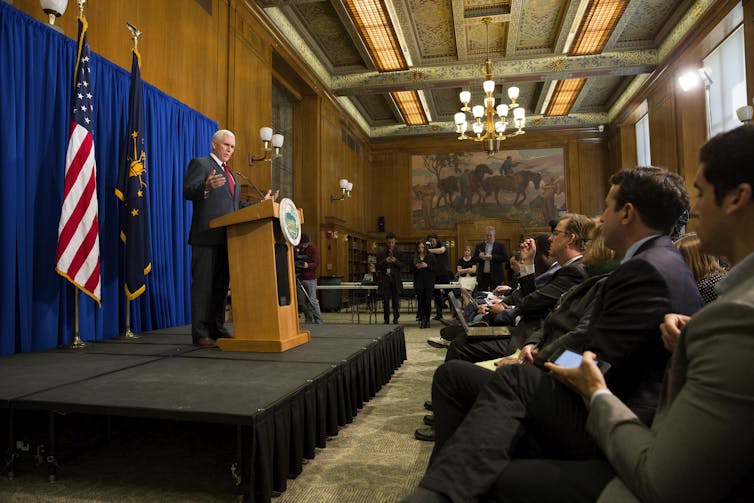
By Kristina M. Lee
When Utah legislators passed a bill requiring the review and removal of “pornographic or indecent” books in school libraries, they likely did not imagine the law would be used to justify banning the Bible.
Utah’s H.B. 374, which took effect in May 2022, “prohibits certain sensitive instructional materials in public schools.” It joins a series of conservative book bans that supporters claim protect children but critics have argued unfairly target LGBTQ+ content and minority authors.
But in early June 2023, the bill stirred further controversy when, after receiving a complaint from a parent using the bill’s provisions, a Utah school district removed the Bible from elementary and middle schools because it contains “vulgarity and violence” deemed inappropriate for the age group.
Utah is not the only state that has faced complaints about the age-inappropriate content of the Bible in response to book bans. In June 2023, a Florida rabbi, Barry Silver, compiled a list of Bible verses that he argues contains violence and sex. Although he maintains he is opposed to censorship, he argues the Bible meets the criteria for Florida’s controversial Parental Rights in Education Act and concludes: “You want to censor books? Start with the one that you like the best.”
In May 2023, the Freedom From Religion Foundation, a nonprofit promoting the separation of church and state, called for Oklahoma to ban the Bible from schools due to its pornographic content. That move came after state education Superintendent Ryan Walters called for a ban on LGBTQ+ books, while arguing the Bible should be taught in government-funded public schools. Like Silver, foundation leaders say they do not support book bans but maintain that if conservative Christians, who have been some of the strongest supporters of recent bans, want to ban books containing sexual references, they cannot ignore the Bible.
Such attempts to ban the Bible based on book ban laws are examples of a protest strategy called “uncivil obedience.”
A different approach to protest
Uncivil obedience is the opposite of the more commonly known protest strategy of civil disobedience, which entails breaking the law in surprisingly respectful ways. Uncivil obedience, on the other hand, involves following the law but in ways that disregard people’s expectations.
Like civil disobedience, the purpose of uncivil obedience is to change laws, but it does so by “mastering the system’s rules.” Protesters may appear to respect authority by carefully following the laws to show what they are doing is legal. But the behavior may be seen as “uncivil” by some because the behavior challenges social expectations, uses laws in ways unintended by their originators, or both.
Uncivil obedience has been used to challenge the practicality and fairness of laws and processes. For example, in the 1990s, protesters challenged low speed limits by strictly following them on a busy California freeway, leading to the disruption of traffic. The strategy has also been used to challenge
immigration policies and election laws.
As a scholar of political and religious rhetoric, I have seen uncivil obedience be embraced by people across the political spectrum as a way to challenge laws – and to specifically use religion as one element of those challenges.
Conservative Christians step to the plate
A federal law passed in 1993 called the Religious Freedom Restoration Act has often been at the center of religious strategists embracing uncivil obedience. That law, which prohibits the government from creating substantial burdens on citizens’ free exercise of religion, was originally passed by Congress in response to a 1990 Supreme Court case that critics argued restricted the religious freedom of Indigenous people. Over 20 states have passed similar laws.
Although the law was originally designed to protect the rights of practitioners of all religions, particularly ones that are not as prominent in the U.S. as Christianity, conservative Christians have used its provisions to resist progressive policies including same-sex marriage and the Affordable Care Act. A common argument proponents use is that the law protects conservative Christian business owners and employees who view recognizing same-sex marriage or providing contraception as a violation of their religious beliefs.
Opponents view the conservative embrace of the idea of religious freedom as a bizarre interpretation of the law, arguing that they are using it for the purpose of justifying discrimination based on religious beliefs. Defenders of the practice, however, argue that they want religion to be free from government intervention.

Aaron P. Bernstein/Getty Images
Progressive groups turn the tables
Now, progressive groups are increasingly using religious freedom arguments, including the Religious Freedom Restoration Act, to justify exemptions from conservative policies.
Most recently, progressive Christian clergy members, Jews, Muslims, Satanists and other religious plaintiffs have begun to file lawsuits in states challenging strict abortion bans. These lawsuits claim their religions allow reproductive health care and abortions, and that bans violate their religious freedom.
The Satanic Temple, one of the religious organizations that embrace opposing injustices as part of its mission, has also used other religious freedom cases to demand the same rights as Christians. For example, the group uses the ruling of Good News Club v. Milford Central Schools, which determined schools cannot prohibit religious clubs from meeting on school ground after hours, to argue that schools also must allow Satanist clubs. Satanists argue that they are just demanding the same rights that Christians have won in court.
Progressive advocates claim they are championing religious freedom and equality. Their opponents, however, argued that plaintiffs are just engaging in “political stunts,” not advocating for sincere religious beliefs.
When uncivil obedience is used, its critics can frame such behavior as unprecedented, dangerous and insincere. Advocates, however, can argue that they are simply trying to follow the law and ask others to do the same. In religious freedom debates, these disputes are at the heart of a crucial question: where to establish the legal limits of religious freedom.
Even failure can become a victory
If uncivil obedience advocates are not successful, they can use their experiences to identify double standards in laws and policies, which can stir public anger over perceived biases regarding religious freedom.
When conservatives lose religious freedom cases, they can claim such losses reflect bias against conservative Christian religious beliefs.
When minority religions or progressive Christians lose their religious freedom cases, they can point to the success of conservative Christians in similar cases to highlight the courts’ protection of conservative religious principles.
Using uncivil obedience is a relatively safe protest strategy – at least legally speaking – because, unlike civil disobedience, those who use it do not risk being arrested. Yet it still allows people to draw attention to social issues in unprecedented ways that can spark public discussion.
There is risk, though. Uncivil obedience tactics can draw immense criticism from the public, who may view such tactics as manipulative or disingenuous. Additionally, although uncivil obedience can draw attention to double standards in societies, those standards can remain obstacles for those wanting social change. This can result in legal challenges that can be long and expensive to pursue but in which there is no guarantee of success.
In Utah, while the Bible was initially banned, public pressure caused the school board to quickly reverse the decision.
In Florida and Oklahoma, challenges to the Bible so far have been dismissed, with the holy book’s supporters arguing that the proposals should not be taken seriously.
Both Rabbi Silver and the Freedom From Religion Foundation have maintained they will continue the fight until attempts to censor books in schools cease, or all books are judged by the same standards.
![]()
Kristina M. Lee is Assistant Professor at the University of South Dakota.





























JimboXYZ says
Figures that the Bible as the word of God would offend those folks, imagine that ?
Been There says
The Bible was written by men with their own hands and agendas claiming their hands were moved by God.
Laurel says
God, a male, was written by men, with their own hands and agendas claiming their hands were moved by this male God. The reason I couldn’t get past the first few pages of the bible was it was all men, who begat other men, no women mentioned. Yeah, no. Seemed impossible to me. Seemed a tad bigoted.
Michael Cocchiola says
Uncivil Disobedience… sounds like a plan to me.
We must fight back against right-wing oppression. They can flout the law because they just don’t care and they are protected by extremist Republicans in the courts. But we have to follow the law. We don’t want to be them… we want to beat them.
Uncivil Disobedience against DeSantis! Let’s fight back for a truly free Florida.
Jim says
I am all for civil disobedience as outlined in this article. It is an excellent way to point out the fallacies of laws that end up banning books and restricting teachers and librarians under the threat of prosecution as well as the implementation of severe restrictions on abortion in this state and many others.
Our governor has removed two prosecutors from their positions for dubious at best reasons. These were elected positions and if they are to be removed it should be through the ballot box. A Georgia teacher was just fired for reading a book that contained some gay-themed characters (and this was despite a review board stating firing was not justified and done on party lines as well). There are other examples but my point is that in this Fascist political climate we currently live, all legal tools should be used by citizens to point out the rampant hypocrisy of these laws, actions and rulings.
This along with voting out elected so-called leaders and putting in place actual leaders who can think and act independently of a rabid minority that just seems to hate everything.
If you don’t resist this kind of social upheaval, eventually you’ll be the one they’re coming for. Read some history (if it’s not banned….)
Laurel says
Love the article!
Hey, fair is fair. Can’t have it both ways, folks. The law is the law. Now, if the law is stupid, like banning books, then it should have been thought out instead of pushing it on all of us thinking we’ll all just go with your one sided flow.
While the mommies for illiteracy are denying brain cells, DeSantis is in search for a personality. What a group!
Ed says
Like the twizzler commercial on tv. I was wondering…
When is the pendulum coming back to center so I can see when up is up and down is down.
The absurdity just keeps on coming. Tap the brakes.
Lawrence Kootnikoff says
Interesting article. But I don’t think the headline, “‘Uncivil Obedience,’ Reactionaries’ New Protest Method” reflects its content. The headline implies that “reactionaries” are using this tactic, while the body says progressives are.